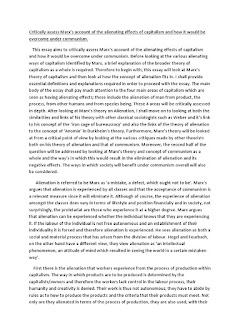The Concept of Alienation Explored in Essays
Alienation is a prevailing theme in countless literary works, films, and discussions that delve into the depths of human experience. It encapsulates feelings of estrangement, detachment, and isolation that individuals may experience in various aspects of their lives. This pervasive concept has captivated the minds of scholars and philosophers, prompting them to explore its many dimensions through thought-provoking essays.
Understanding Alienation
Alienation, in its essence, refers to the state of being separated or estranged from something or someone. It can manifest in multiple forms, including social, psychological, and existential alienation. Social alienation occurs when individuals feel disconnected from their society, community, or peers, leading to a sense of not belonging. Psychological alienation, on the other hand, pertains to feelings of detachment from oneself, often resulting in a loss of identity or purpose. Lastly, existential alienation addresses the profound disconnect humans experience when attempting to find meaning and purpose in existence.
Analyzing Alienation in Literature
Throughout history, numerous literary works have explored the theme of alienation, providing readers with a deeper understanding of this complex human experience. Essays focusing on alienation in literature often analyze characters who grapple with feelings of isolation and the impact it has on their lives. These works can serve as mirrors, reflecting the alienation we sometimes feel in our own lives, and enabling us to connect with characters who share our struggles.
Franz Kafka's renowned novella "The Metamorphosis" explores the theme of alienation through the transformation of the protagonist, Gregor Samsa, into a grotesque insect. Kafka vividly depicts Gregor's alienation from his family, society, and even his own body, as he navigates his new existence. This powerful work prompts readers to contemplate themes of identity, societal expectations, and the consequences of isolation.
In addition to "The Metamorphosis," authors like Albert Camus, Virginia Woolf, and J.D. Salinger also delve into the concept of alienation in their respective works. From Camus' depiction of the human condition in "The Stranger" to Woolf's exploration of isolation in "Mrs. Dalloway," these essays in literature encapsulate the complexities of alienation and its effects on individuals.
A Contemporary Perspective
Essays on alienation are not limited to classic literature; they also provide insights into contemporary issues surrounding social disconnection. With the rise of technology and social media, individuals face a new kind of alienation—disconnection in a connected world. This type of alienation highlights the paradox of constant connectivity while feeling emotionally detached from those around us.
Moreover, essays on alienation have also delved into the impact of the COVID-19 pandemic on human connection. The necessary social distancing measures have amplified feelings of isolation and estrangement, leading to the exploration of newfound forms of alienation in an unprecedented global context.
The Importance of Reflection
Essays on alienation serve as catalysts for contemplation and self-reflection. They encourage individuals to examine their own experiences of alienation and explore ways to overcome them. By shedding light on the intricate nature of human disconnection, these essays contribute to a greater understanding of ourselves and our place in the world.
Ultimately, the myriad essays on alienation across different mediums offer profound insights into the human condition, fostering empathy and understanding. As we read, analyze, and reflect upon these essays, we gain valuable perspectives on the universal struggle to belong and find meaning in a society that often leaves us feeling isolated.
- Are you interested in exploring different forms of alienation portrayed in literature?
- Has the rise of social media contributed to your own feelings of disconnection?
- What are some strategies that may help combat feelings of alienation in today's digitally connected world?

No comments:
Post a Comment